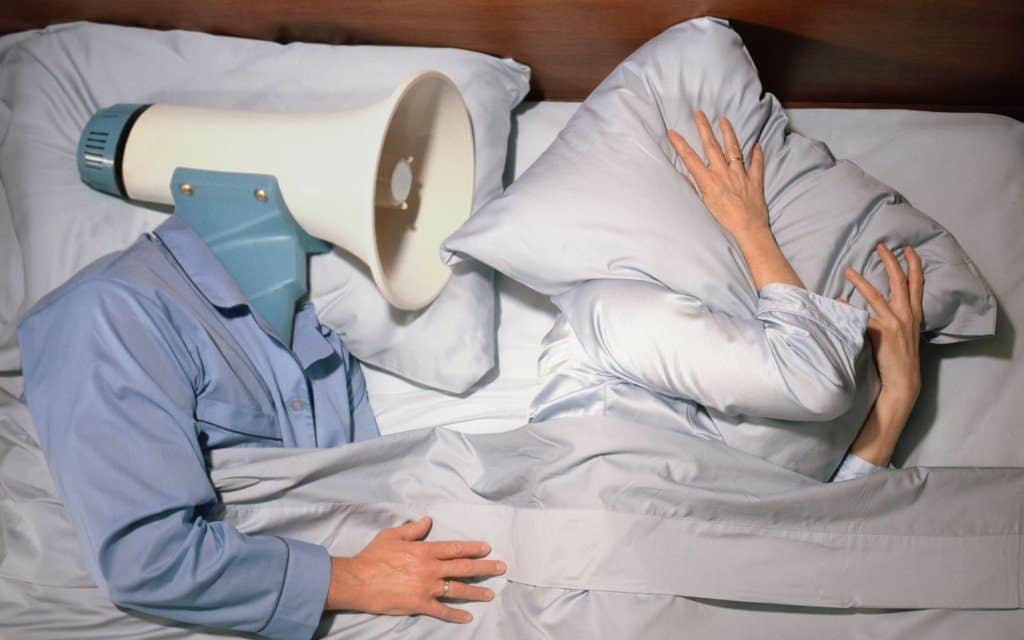Snoring, whose volume can reach between 50 and 100 decibels, equivalent to the noise of a pneumatic drill in some cases should not be underestimated. Even the Guinness Book of Records records a case of 93 decibels two-thirds of the noise produced by a passenger aircraft.
Snoring: practical and homemade solutions for a quiet rest
If you’re looking to put an end to those annoying snoring, there are practical, homemade solutions you can consider.
First of all, it is important to avoid drinking alcohol and other sedatives before bed. In addition, changing your sleeping position can make a difference: choose to sleep on your side instead of on your back whenever possible.
If you find yourself overweight losing a few pounds can help reduce snoring.
There are practical solutions you can try. Drug-free nasal strips, available without a prescription, help dilate the nostrils to improve breathing. Another option is to sew little balls on the back of the pajamas such as a tennis or golf ball, to create discomfort when trying to sleep on your back, thus encouraging the habit of sleeping on your side.
In cases of mild sleep apnea or persistent snoring, a plastic mouthpiece fitted by a dentist to the jaw and tongue can keep the airway open during sleep.
For those who suffer from obstructive sleep apnea, the CPAP (Continuous Positive Airway Pressure) mask is considered to be the most effective treatment. This nasal mask helps keep the airway clear through positive air pressure.
If snoring has been disturbing your sleep consider trying some of these practical, homemade solutions for a restful, restful rest.
Innovation and alternatives to combat snoring
A new product has been noticed on international shopping websites: the bear-shaped anti-snoring pillow an invention from Japan. This ingenious device has a sensor that detects snoring and when it captures the sound the bear lifts one leg to gently move the snore to move the snore to a more favorable position.
For those looking for more definitive solutions, there are surgical options. In case of airway obstruction, you may choose to have the tonsils and adenoids removed. In more extreme situations, part of the tissue of the palate and roof of the mouth may be removed.
There are natural alternatives that can help reduce snoring. Honey, renowned for its expectorant properties and ability to relieve throat irritation, is recommended for eliminating phlegm and controlling infections.
It is advisable to gargle with a warm infusion of raspberry leaves mixed with two teaspoons of honey in half a glass of water.
Peppermint and eucalyptus, known for their expectorant effects have the ability to open the respiratory tract and soothe the throat. An effective mix involves combining equal parts of your essential oils with water and spraying the head of the bed before bed.
You can also choose to do steam inhalations using mint and eucalyptus leaves in boiling water.
Natural alternatives to combat snoring
Onions, renowned for their decongestant properties are a great help in clearing obstructed respiratory tracts, one of the main causes of snoring. It is recommended to cut an onion in half sprinkle salt on it and place it on a plate on the light table before bed.
Olive oil may be beneficial in reducing snoring. Prepare a mixture with a glass of olive oil and 50 grams of rum in an airtight container, cover it and let it macerate for two weeks. Then it must be strained and stored in a dark container. Before going to bed, apply this mixture to the fins of the nose, neck and back of the neck.
For those looking for a homemade solution, you can opt for a homemade inhaler. Prepare a saline solution with one cup of room temperature water, half a teaspoon of salt and a pinch of baking soda. Apply a splash of this solution to the nose before bed to clear the airway.
It is important to note that, if there are symptoms such as changes in the level of attention, concentration or memory, tiredness when waking up, episodes of apnea or excessive sleepiness during the day, it is advisable to consult a doctor.
Recent weight gain and morning headaches should be considered, as they may be related to snoring. A health professional will be able to provide appropriate diagnosis and treatment.
It’s important to consider the impact of chronic hoarseness on children
Children who suffer from chronic hoarseness should be evaluated for sleep apnea since its presence at this stage of life is related to growth problems, attention deficit hyperactivity disorder, poor school performance, learning difficulties, enuresis and high blood pressure.
Although most children who snore don’t have apnea a reliable study is essential to rule it out completely.
To prevent your health and that of your partner from being affected by these annoying sounds, you should see a doctor as soon as possible. An early approach will help improve the situation and avoid potential future risks.





